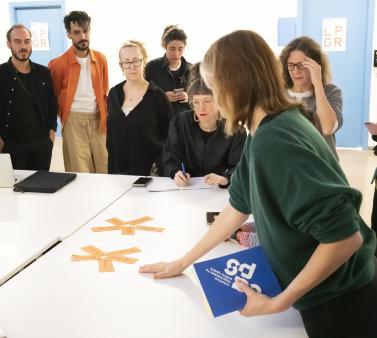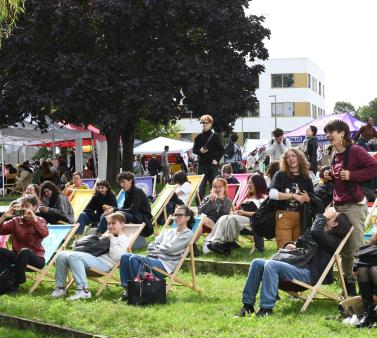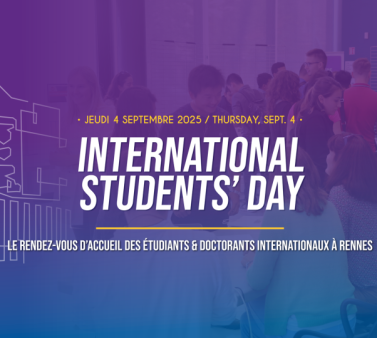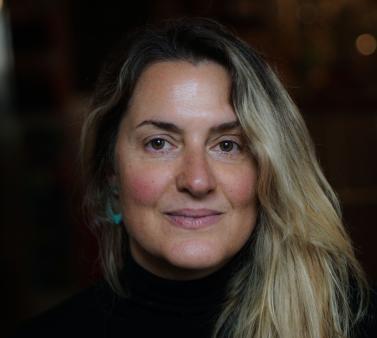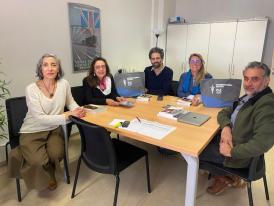
Pictured from left to right: Dr. Amal Jouffe El-Amrani, Pr. Jimena Obregon, Dr. Pablo Ortemberg, Pr. Ana Guglielmucci, Associate Pr. Andrès Castro
A researcher at the National Council for Scientific and Technical Research (CONICET) and Director of the Center for the Study of Political History (CEHP) at the School of Politics and Government (EPyG) of theNational University of San Martín (UNSAM) in Argentina, Dr. Ortemberg brings a wealth of expertise to these topics.
During his visit as part of the Chair of the Americas program, he shared insights on his academic journey, his experience at Rennes 2, and the potential for future collaborations.
This wasn’t your first time at Rennes 2. Please tell us what brought you back?
No, my first experience at Rennes 2 was in 2006 when I worked as a teaching and research assistant while completing my doctoral studies in France. I have very fond memories of the university, the city, and its people. But beyond nostalgia, I was eager to reconnect with Professor Jimena Obregón Iturra and collaborate with colleagues like Professor Andrés Castro Roldán, whose research closely aligns with mine. Their work in history and anthropology—spanning colonial history to contemporary cultural studies—made this an excellent opportunity for academic exchange.
How did this collaboration take shape?
I was already familiar with the Chair of the Americas program and saw it as a great opportunity. Given my research on national identity construction through patriotic celebrations—an area closely linked to work conducted at the ERIMIT research center—I reached out to Jimena Obregón to explore the possibility of applying.
Our collaboration is built on shared academic interests. In 2020, Jimena Obregón organized seminars on festive rituals, a theme that aligns perfectly with my research agenda. We are now working to expand this collaboration into an interdisciplinary network involving history, anthropology, and cultural studies, with prospects for joint projects, PhD co-supervision, and academic exchanges.
What were some of the key activities you led during your visit?
As a visiting professor, I conducted several academic sessions across different levels of study. I delivered three lectures within the Languages, Literature, and Civilizations Spanish program, covering topics such as Bicentenarios patrios, identidad nacional y grupos marginalizados (First-year students) and La invención del poder real en la América colonial (Second-year students, Pre-Hispanic and Colonial History). Additionally, I contributed to a Master’s seminar on interdisciplinary research methods and led a doctoral workshop on analyzing power rituals.
Beyond teaching, I participated in a seminar organized by my hosts, Jimena Obregón and Andrés Castro, and took part in a theoretical and methodological discussion during a doctoral seminar. I also contributed to the 2nd International Seminar: Museums and Memory Dynamics in South America, where I presented on the inclusion and exclusion of Indigenous peoples in Latin American centennials and bicentennials.
Throughout my stay, I met with colleagues and PhD students to discuss research perspectives, explore potential collaborations, and strengthen academic exchanges between UNSAM and Rennes 2.
Where do you see the most exciting opportunities for future collaboration?
The study of national identities, marginalized groups, and forms of representation is a crucial area of shared interest. These topics will be related to issues surrounding the concepts of heritage and plural citizenship. We are already in discussions about establishing an institutional agreement between UNSAM and Rennes 2 to facilitate academic exchanges. This would provide new opportunities for students and researchers alike.
How did you find your experience at Rennes 2?
It was an excellent experience, both academically and personally. Engaging with students at different levels was particularly rewarding, and my interactions with colleagues helped foster new academic connections. Rennes itself offers an ideal setting for research, with a dynamic intellectual and cultural environment.
What would you say to students and researchers at UNSAM considering a visit to Rennes 2?
I would strongly encourage them to seize the opportunity. Rennes 2 offers a vibrant academic environment, outstanding faculty, and a welcoming community. It’s a fantastic place to deepen one’s understanding of Latin American studies and engage in meaningful interdisciplinary dialogue.

